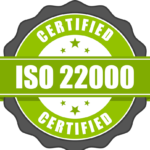Location
602, 6th Floor, Ceaser’s Tower Karachi
+92 300 8270988
+92 300 8218041
Monday – Saturday
9:00am – 06:00pm
602, 6th Floor, Ceaser’s Tower Karachi
+92 300 8270988
+92 300 8218041
9:00am – 06:00pm
ISO 22000:2018 certification covers all the processes in the food chain that impact the safety of the end product. The standard specifies the requirements for a comprehensive food safety management system, as well as incorporating the elements of Good Manufacturing Practice (GMP) and Hazard Analysis Critical Control Points (HACCP).
ISO 22000:2018 creates a single food safety standard that harmonizes the various national standards into one easy-to-understand set of requirements that are simple to apply and recognized around the world. This internationally recognized food safety standard can be used by all organizations in the food supply chain from farming to food services, processing, transportation and storage through packaging to retail.
Our ISO 22000:2018 certification service helps you to demonstrate your commitment to food safety. Whether you hold an existing ISO 22000 certificate and wish to transition, or you are new to certification and want to understand the benefits to your business, we can support you with everything from audits to implementation and training.

Have a question or need consultation in regards to ISO 22000? Contact a consultant below.
On June 19, 2018, an update to ISO 22000:2018 was published, which included a number of important modifications. These are some of them:
Greater integration across ISO standards is made easier by adhering to the Higher Level Structure (HLS) convention, which is required for all new or updated standards. This makes incorporating ISO 22000:2018 into an existing ISO management system a lot easier.
Easier to understand: the standard’s requirements have been thoroughly reviewed, with extra clarity provided by clarifying terminology such as PRP and oPRP to facilitate comprehension and implementation.
Greater alignment with Codex HACCP: in order to ensure that implementation follows the Codex methodology, the requirements have been updated to closely reflect the Codex phases, ensuring that HACCP development is now entrenched inside the standard.
Simpler implementation: particular specified information identified within the standard allows you to create a set of documents that meet ISO 22000:2018 requirements.
Clarification of the PDCA (Plan-Do-Check-Act) cycle: ISO 22000:2018 clarifies the application of the PDCA (Plan-Do-Check-Act) cycle so that companies may guarantee that processes are sufficiently resourced and managed and that opportunities for improvement are taken advantage of. Based on the Codex HACCP principles, the version uses two interconnected PDCA cycles: the food safety management system and the product production/service delivery PDCA.
A new approach to risk: previously, the standard exclusively addressed the product’s risk to the final consumer by applying the Codex HACCP principles. Codex HACCP is still necessary for the latest iteration, however, it will be augmented by an organizational risk assessment.
Simplified clause structure: because the update follows a step-by-step process, it provides for a more linear approach to implementation.
Feel free to contact one of our representatives.

Ace Management System Consultants is an ISO 9001 certified organization that provides customization consulting, training, auditing, and certification services that reduce risks and save time for organizations while educating, empowering, and enabling leadership to implement, improve and integrate management systems and strategic initiatives.
All rights reserved – Copyrights © Ace Management System Consultants
Designed & Developed by Tech Vision